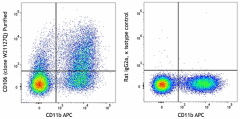- Clone
- W21127Q (See other available formats)
- Regulatory Status
- RUO
- Other Names
- VCAM-1, INCAM-110
- Isotype
- Rat IgG2a, κ
- Ave. Rating
- Submit a Review

| Cat # | Size | Price | Quantity Check Availability | Save | ||
|---|---|---|---|---|---|---|
| 166102 | 100 µg | 88€ | ||||
CD106, also known as VCAM-1 and INCAM-110, is a 110 kD glycosylphosphatidylinositol (GPI)-linked transmembrane protein. It is constitutively expressed on bone marrow stromal cells, myeloid progenitors, splenic dendritic cells, activated endothelial cells, as well as some lymphocytes. CD106 expression can be upregulated on endothelial cells by inflammatory cytokines. CD106 is involved in adhesion and acts as a counter-receptor for VLA-4 (α4/β1 integrin) and LPAM-1 (α4/β7 integrin).
Product DetailsProduct Details
- Verified Reactivity
- Mouse
- Antibody Type
- Monoclonal
- Host Species
- Rat
- Immunogen
- Transfectant cells (aa25-692) and recombinant protein (aa25-692)
- Formulation
- Phosphate-buffered solution, pH 7.2, containing 0.09% sodium azide
- Preparation
- The antibody was purified by affinity chromatography.
- Concentration
- 0.5 mg/mL
- Storage & Handling
- The antibody solution should be stored undiluted between 2°C and 8°C.
- Application
-
FC - Quality tested
IHC-F - Verified - Recommended Usage
-
Each lot of this antibody is quality control tested by immunofluorescent staining with flow cytometric analysis. For flow cytometric staining, the suggested use of this reagent is ≤ 0.25 µg per million cells in 100 µL volume. For immunohistochemical staining on frozen tissue sections, a concentration range of 5.0 - 10.0 µg/mL is suggested. It is recommended that the reagent be titrated for optimal performance for each application.
- Application Notes
-
Flow cytometry testing showed that clone W21127Q can block the binding of clone
429 (MVCAM.A) on target cells.
Flow cytometry testing showed that clone W21127Q does not affect the binding of clone W21127K on target cells. - RRID
-
AB_3097229 (BioLegend Cat. No. 166102)
Antigen Details
- Structure
- Ig superfamily, 47 kD
- Distribution
-
Bone marrow stromal cells, myeloid progenitors, splenic dendritic cells, activated endothelial cells
- Function
- Adhesion
- Ligand/Receptor
- VLA-4 (α4/β1 integrin) and LPAM-1 (α4/β7 integrin)
- Cell Type
- Dendritic cells, Endothelial cells, Mesenchymal Stem Cells
- Biology Area
- Cell Adhesion, Cell Biology, Immunology, Neuroinflammation, Neuroscience, Stem Cells
- Molecular Family
- Adhesion Molecules, CD Molecules
- Antigen References
-
- Barclay AN, et al. 1997. The Leukocyte Antigen FactsBook Academic Press.
- Kinashi T, et al. 1995. J Leukoc Biol. 57:168-73.
- Bevilacquea MP. 1993. Annu Rev Immunol. 11:767-804.
- Koni PA, et al. 2001. J Exp Med. 193:741-54.
- Gene ID
- 22329 View all products for this Gene ID
- UniProt
- View information about CD106 on UniProt.org
Related FAQs
Other Formats
View All CD106 Reagents Request Custom Conjugation| Description | Clone | Applications |
|---|---|---|
| Purified anti-mouse CD106 | W21127Q | FC,IHC-F |
Compare Data Across All Formats
This data display is provided for general comparisons between formats.
Your actual data may vary due to variations in samples, target cells, instruments and their settings, staining conditions, and other factors.
If you need assistance with selecting the best format contact our expert technical support team.

 Login / Register
Login / Register 















Follow Us